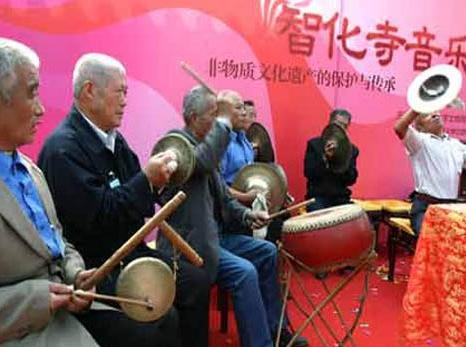
Jizhong Folk Pipe-wind Music is prevalent on Central Hebei Plain which is located to the south of Beijing, the west of Tianjin and the north of Cangzhou and Dingzhou, including nearly 30 cities and counties. It is a type of percussion and wind, known as "Concert" among the general public. As wind pipes are mainly used to lead the performance and shengs are used to play accompaniment, it is also called "Pipe-wind Music". Apart from sheng (a reed pipe wind instrument), wind pipe and other pipe-shaped instruments, such instruments as Chinese gong chimes, flute as well as beating-type instruments including drum, big cymbal, small cymbal and clank are used to play Pipe-wind Music. The melody is divided into three types: divertimento, ditty, and percussion which forms a complete set of melodies by itself. Featuring lengthiness and complicated structure, divertimento is a principal part of Pipe-wind Music. Villagers in these regions will get together to play and listen to Pipe-wind Music in many folk activities such as sacrifice offering, amenity and funeral.
Performance of Jizhong Folk Pipe-wind Music is originally of two types: "North Concert" and "South Concert". A band of "North Concert" consists of eight to ten players. The major musical instrument - wind pipe is featured by fairly slender body, small volume, gentle tone as well as primitive and elegant performing style and low speed. By contrast, a band of "South Concert" consists of over ten players. The major musical instrument is featured by fairly thick body. A wind pipe is used as the major pipe and multiple pipes are taken as auxiliary ones. Combination of them will create sonorous sound, varied rhythms as well as brisk and funny style and comparatively high speed. Representative melodies of Jizhong Folk Pipe-wind Music include Pasturing Donkey, Xiaoerfan, Daerfan and Eternal Joyance.
All performers of Jizhong Folk Pipe-wind Music are farmers engaging in agricultural production. They will get together in almost every evening to play the music other than in busy farming season. Apart from self-entertainment, they participate occasionally in performance in funeral, wedding ceremony and other joyful occasions (they would receive no remuneration for performance in their own village, and will receive it when being invited to other villages to make performance). Days close to the Lantern Festival (the 15th day of the first lunar month) every year is the prime time for singing and performing gatherings.





